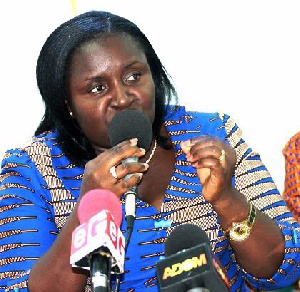- Home - Entertainment
- Lifestyle News
- Entertainment Videos | TV
- Year In Review
- Music News
- Entertainers
- Entertainment Archive
- Entertainment Photos
- Jokes
- Entertainment Headlines
- Ameyaw Debrah
- Brown GH
- Celebrities Buzz
- GH Base
- Ghana Celebrities
- Gh Gossip
- GH Page
- GH Splash
- Hot Gossip GH
- YEN

General News of Tuesday, 18 September 2018
Source: ghananewsagency.org
Focus on preventive measures to curb corruption - GACC
The Ghana Anti-Corruption Coalition (GACC) on Tuesday underscored the need for stakeholders to focus more on preventive measures in the fight against corruption in the country.
Mrs Beauty Emefa Narteh, the Executive Secretary, GACC, said “as a country we have made some commitment in terms of strides but there was a lot more to be done particularly in the area of enforcement, which remained one of the biggest challenges”.
She said GACC recognises government’s effort in introducing measures such as paperless port policy, however, there was a need to do more with regards to how to have limited public and citizens’ engagement in terms of service delivery.
Mrs Narteh made these remarks in an interview with the Ghana News Agency (GNA) on the sideline of a roundtable on Fiscal Transparency and Accountability Demands of Civil Society Organization (CSOs) to Government.
She explained that, these prevent measures were important; to help take away vulnerabilities in the fight against corruption.
“The other challenge is that, we have not been able to put in the political will; which is not only at the political level but even at the institutional level,” she added.
The GACC Executive Secretary said the institutions mandated to serve as anti-corruption agencies had not been able to perform well due to the challenges they were having, such as their human resource capacity and independence.
She noted that interference in the activities of anti-corruption agencies would suggest that their independence was being stifled.
Mrs Nartey said GACC was hopeful that all institutions mandated to perform these anti-corruption measures would have the independence to work and operate; so that the reasons behind the constitutional provisions for their establishment would be fully achieved or attained.
The roundtable, which was organised by the GACC, discussed Civil Society’s fiscal transparency and accountability demands on the government, the extent of government response and the way forward.
The roundtable was part of a project dubbed “Citizens Action for Public Accountability and Pro-Poor Spending,” which is being implemented by the GACC and the Economic Governance Platform with support from OXFAM in Ghana.
The project aims at creating public awareness on the budget and to mobilize citizens to demand accountability and fairness in the fiscal regime towards addressing inequality.
The demands discussed include: A call for a more aggressive domestic tax revenue mobilization; and a call for independent bodies to investigate payment practices in Parliament.
Others are a call to translate commitments from the United Kingdom Anti -Corruption Summit into real actions and a call for the empowerment of citizens.
The rest are the creation of the Office of the Special Prosecutor (OSP); a call for a review of the Public Financial Management Act; a call for the regular publication of budget information; and a call for the speedy and transparent investigations into corruption allegations.
The GACC is a unique cross-sectoral grouping of public, private and civil society organizations (CSOs) with a focus on promoting good governance and fighting corruption in Ghana.
Its vision is a Ghana that is free from corruption where honesty, transparency, accountability, integrity and inclusion are upheld, thereby, helping to improve the standard of living of the people.











